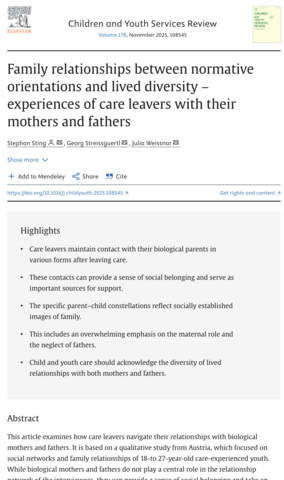This article examines how care leavers navigate their relationships with biological mothers and fathers. It is based on a qualitative study from Austria, which focused on social networks and family relationships of 18-to 27-year-old care-experienced youth. While biological mothers and fathers do not play a central role in the relationship network of the interviewees, they can provide a sense of social belonging and take on important support functions due to scarce social resources in the process of leaving care. The results illustrate how the tension between socially established normative images of mothers and fathers and diverging family-related experiences influences relationships with fathers and mothers. This tension also shapes the practices and interventions of the child and youth welfare system.

